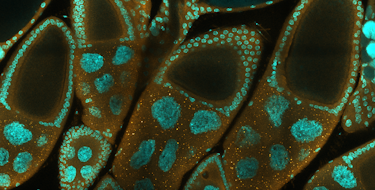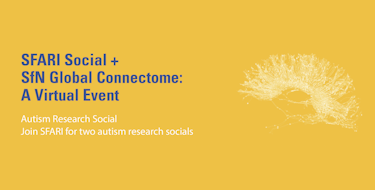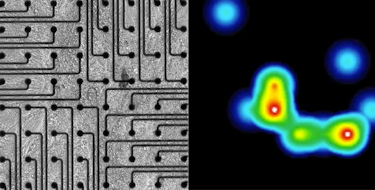Bridge to Independence Award Program
The SFARI Bridge to Independence (BTI) program engages talented early-career scientists from diverse and/or historically underrepresented backgrounds to pursue research in autism and facilitates their transition into independent faculty positions at research institutions within or outside the U.S.
The program is aimed at Ph.D. and/or M.D.-holding scientists from diverse and/or historically underrepresented groups in science who are currently in a non-independent, mentored training position at an institution within or outside the U.S. and who will be actively seeking and applying to tenure-track faculty positions between September 2024–May 2025. Independence Fellows are expected to apply, secure and transition to a tenure-track faculty position at a research institution within or outside the U.S. by the end of the 2025–2026 academic year. U.S. citizenship or permanent resident status is not required. The BTI Award program welcomes applications that span the breadth of science that SFARI supports, including genetics, molecular mechanisms, circuits and systems, and clinical science.
Independence Fellows will receive up to two (2) years of postdoctoral fellowship support during their job search, with an annual salary of $85,000 USD, fringe benefits, an annual resource and professional development allowance of $10,000 USD, and indirect costs (see our grant policies) followed by a commitment of $600,000 USD over three (3) years, including indirect costs (see our grant policies), activated upon assumption of a tenure-track research professorship. The fellows will form a learning community and engage in professional development activities throughout their transition to research independence.
- SAM opens for applications
- Informational Zoom session
- Applications and Letters of Recommendation due
- Finalists Invited for Interviews
- Virtual interviews
May 2 and 3, 2024 - Applicants Notified of Funding Decisions
- Postdoctoral Award Start Date
- SAM opens for applications
- Informational Zoom session
- Applications and Letters of Recommendation due
- Finalists Invited for Interviews
- Virtual interviews
May 2 and 3, 2024 - Applicants Notified of Funding Decisions
- Postdoctoral Award Start Date
- Scientific inquiries:
[email protected] - Administrative inquiries:
[email protected] - Simons collections inquiries:
[email protected] - Technical Assistance:
[email protected] - Office Hours:
Monday–Friday 9:00 a.m.–5:00 p.m. Eastern Time
- Office Closures:
The Simons Foundation offices will be closed November 22–26, 2023, and December 23, 2023–January 1, 2024.
- SAM opens for applications
- Informational Zoom session
- Applications and Letters of Recommendation due
- Finalists Invited for Interviews
- Virtual interviews
May 2 and 3, 2024 - Applicants Notified of Funding Decisions
- Postdoctoral Award Start Date
- Scientific inquiries:
[email protected] - Administrative inquiries:
[email protected] - Simons collections inquiries:
[email protected] - Technical Assistance:
[email protected] - Office Hours:
Monday–Friday 9:00 a.m.–5:00 p.m. Eastern Time
- Office Closures:
The Simons Foundation offices will be closed November 22–26, 2023, and December 23, 2023–January 1, 2024.
Description of Award Program
The SFARI Bridge to Independence (BTI) program engages talented early-career scientists from diverse and/or historically underrepresented backgrounds to pursue research in autism and facilitates their transition into independent faculty positions at a research institution within or outside the U.S.
We seek to support the next generation of top autism researchers. The BTI Award program welcomes applications that span the breadth of science that SFARI supports, including genetics, molecular mechanisms, circuits and systems, and clinical science. For reference, please see SFARI scientific perspectives.
The program is aimed at Ph.D. and/or M.D.-holding scientists from diverse and/or historically underrepresented groups in science who are currently in a non-independent, mentored training position at an institution within or outside the U.S. and who will be actively seeking and applying to tenure-track faculty positions between September 2024–May 2025. Independence Fellows are expected to apply, secure and transition to a tenure-track faculty position at a research institution within or outside the U.S. by the end of the 2025–2026 academic year. U.S. citizenship or permanent resident status is not required.
We believe that diversity promotes innovation and excellence in science. SFARI supports innovative research in autism, and values that diversity among investigators can advance the SFARI mission. The SFARI BTI program offers a pathway that will lead to greater diversity in our scientific community and make a significant positive impact in the scientific environment. The award, paired with professional development and community-building activities, will empower early-career scientists to conduct cutting-edge, high-impact research, while simultaneously contributing to a more inclusive scientific environment for all. We envision that the fellows will become independent investigators, make major scientific contributions in their fields and inspire the next generation of talent.
The Independence Awards program recognizes individual diversity to encompass a wide spectrum of human differences. For the purposes of this award, we aim to support scientists from diverse and/or under-represented groups within these categories: race, ethnicity, disadvantaged social and/or economic status, gender identity, sexual orientation and disability status. Please see the eligibility criteria for more information. We also recognize that diversity and underrepresentation can vary from setting to setting and across countries. We will rely on applicants’ signed self-attestation and cannot not make any other formal determination regarding an individual’s identity, disability status or disadvantaged social and/or economic background.
The SFARI BTI Award is one of three (3) programs that seek to facilitate the transition of early-career scientists from diverse and/or historically underrepresented backgrounds into independent faculty positions. The other Independence Awards are offered through the Simons Collaboration on Plasticity and the Aging Brain (SCPAB) and Simons Collaboration on the Global Brain (SCGB). Information about all three programs can be found here. Candidates may apply to all programs but may only accept one award. Each application will be reviewed individually based on the program’s own selection process. It is expected that applicants will tailor their application to align with the respective program to which they are applying.
Activities and Funding
Independence Fellows are expected to seek and apply to tenure-track faculty positions between September 2024–May 2025. Independence Fellows are expected to apply, secure and transition to a tenure-track faculty position at a research institution within or outside the U.S. before or by the end of the 2025–2026 academic year.
The SFARI BTI fellows will form a learning community with fellows from the SCPAB TTI Award program and SCGB TTI program. The fellows engage in professional development activities throughout their transition to research independence in order to support them in their faculty job search and in establishing their independent laboratory. Activities include participation in virtual community meetings, workshops and 1:1 meetings with an assigned external mentor and Simons Foundation scientists and staff, as well as in-person attendance at invited investigator meetings and Independence Award retreats each year.
All Independence Fellows are expected to meet with Simons Foundation scientists and staff regularly to provide updates pertinent to their transition to independence. Simons Foundation scientists and staff are available to provide perspective and personalized coaching throughout the faculty job search, offer and negotiation process. Our intention is to provide support as fellows negotiate a start-up package that allows each individual to be optimally successful as an independent investigator. The program is designed to enhance fellows’ job prospects by providing a letter that specifies our financial commitment to the award research plan while the fellow is seeking and negotiating faculty job offers. Institutional start-up packages may not be reduced because of the Faculty Research Award funding
Independence Fellows will be provided with up to five (5) years of support, split into two awards: 1) Postdoctoral Award (for a maximum of two (2) years), and 2) Faculty Research Award (over three (3) years). Please see our grant policies for further guidelines.
Please note that in the event of budgetary or other considerations The Simons Foundation, Inc. reserves the right to refer an application to The Simons Foundation International, Ltd. (SFI) for consideration and funding, in which case SFI’s grant policies would apply.
Postdoctoral Award: Up to two (2) years of support
To hold this award, the fellow must be appointed as an employee of the university, with no teaching obligations, and receive the standard benefits package that the university provides to employees. The postdoctoral support can be provided to fellows who hold titles other than ‘postdoctoral’ researcher so long as the position is a non-independent, mentored training position. See FAQ for guidelines.
This grant will be administered through the fellow’s current institution and includes funding for an annual $85,000 USD salary plus applicable fringe benefits at the current institution’s standard fringe rate, and an annual $10,000 USD allowance for professional development. Indirect costs are limited to 20 percent of the modified total direct costs on eligible direct costs (see our grant policies). As such, the total funding amount will be dependent on the institution’s fringe benefit policies and total award indirect costs.
The salary for the fellow may be supplemented by the fellow’s institution to equal a salary greater than $85,000 USD, by the mentoring Principal Investigator or by another fellowship, if permissible under the terms of that fellowship.
If the fellow chooses, the salary may be used in whole or in part toward the salary of support personnel, such as a research assistant or technician to assist with the fellow’s research projects.
During the postdoctoral award, fellows are expected to be actively seeking, and transitioning to a faculty position. The fellow will be expected to make progress toward the scientific plans described in the SFARI BTI application after their independent faculty position has started.
Independence Fellows who transition to a faculty position before the end date of the postdoctoral award (August 31, 2026) will be required to terminate their postdoctoral award effective the fellow’s departure date from their current institution. Any unexpended funds remaining after the effective date of termination must be returned. The postdoctoral award funds cannot be transferred to the fellow’s faculty institution or added to the faculty research award.
Faculty Research Award: Up to three (3) years of support
Upon transitioning to a suitable faculty position (as described above), Independence Fellows will be eligible to activate their Faculty Research Award. The award is intended as a supplement to a full institution-provided start-up package. Funds may be used for all reasonable costs related to the fellow’s award research plan, consistent with our grant policies, except for the following: 1) Principal Investigator salary support, and 2) general lab equipment, such as freezers and refrigerators. However, salary support for laboratory personnel and specialized equipment, such as microscopes, are permitted.
The grant will be administered to the institution at which the fellow has a faculty appointment. The total budget for the Faculty Research Award is $600,000 USD or less, inclusive of 20 percent indirect costs, over a period of three (3) years. Fellows are expected to activate this award within the first 12 months of starting their faculty position. In order to activate the Faculty Research Award, fellows are required to submit an application via the Simons Award Manager (SAM) 2–3 months prior to the desired award start date. Review of the Faculty Research Award application is a non-competitive, internal process intended to confirm that the fellow has secured a tenure-track or equivalent faculty position at a suitable institution, as described above. Simons Foundation staff will review the application. Upon activating the Faculty Research Award, fellows will formally become SFARI investigators.
Informational Sessions for Potential Applicants
Those interested in applying are encouraged to view a video recording of the informational session held on November 2 – Click here to watch the recording.
Informational videos on how to navigate the grants management system Simons Award Manager (SAM) can be found here.
Application and Interview Process
To apply to the SFARI BTI Award program, individuals must submit an application by January 10, 2024. Please refer to the How to Apply instructions for a list of application requirements and detailed instructions. Applicants are required to focus their scientific proposal on their plans for their future lab and independent research program, not the remainder of their postdoctoral position.
Applications are reviewed by Simons Foundation scientific staff and an expert review committee. Finalists will be invited for a short virtual interview with Simons Foundation scientific staff and the review committee. The interview will take place either May 2 or May 3, 2024
Reviewers will assess criteria related to the applicant’s scientific merit, demonstrated preparedness for an independent investigator position at this time, plans for contributing to diversity, equity, and inclusion in their own independent laboratory and scientific area, and ability to formulate an impactful, innovative and feasible autism-focused research plan.
SFARI BTI fellows will be notified about the final outcome of their application by July 2024.
Eligibility
To be eligible for the SFARI BTI Award, applicants must meet the following criteria. We will rely on your signed self-attestation and cannot make any other formal determination regarding your identity, disability status or disadvantaged social and/or economic background. We recognize that diversity varies across different settings and across countries. For additional information, see our FAQ.
- The program is open to individuals who self-identify as members of diverse groups within these categories: race, ethnicity, disadvantaged social and/or economic background, gender identity, sexual orientation and disability status. Examples of eligible applicants include individuals identifying as:
- Black;
- Indigenous;
- Latine;
- Having a disability;
- A woman;
- A member of the LGBTQIA+ community or a sexual or gender minority;
- For U.S. applicants, studied or are currently in a position at a Historically Black College and University (HBCU), Hispanic-serving Institution (HSI), Tribally Controlled Colleges and University (TCCU), Alaska Native and Native Hawaiian Serving Institution or Asian American and Native American Pacific Islander-Serving Institution (AANAPISI); or
- Coming from a disadvantaged social and/or economic background. We will consider individuals to have come from a disadvantaged background if they meet two (2) or more of the following criteria:
- Were or currently are homeless;
- Were in the foster care system;
- Have/had no parents or legal guardians who completed a bachelor’s degree;
- Were eligible for government-assisted meal programs, such as, for U.S. applicants, the U.S. Federal Free and Reduced Lunch Program;
- Were eligible for government-assisted programs for low-income individuals, such as, for U.S. applicants, the U.S. Special Supplemental Nutrition Program for Women, Infants and Children as a parent or child;
- For U.S. applicants, were eligible for U.S. Federal Pell grants; or
- For U.S. applicants, grew up in one of the following areas: (a) a U.S. rural area, as designated by the Health Resources and Services Administration Rural Health Grants Eligibility Analyzer, or (b) Centers for Medicare and Medicaid Services-designated Low-Income and Health Professional Shortage Areas (qualifying zip codes are included in the file).
- U.S. citizenship or permanent resident status is not required.
- Applicants must hold a Ph.D. and/or M.D., or equivalent degree.
- Applicants must be currently in a non-independent, mentored training position as recognized by their institution.
- Applicants must be actively seeking and applying to tenure-track faculty positions at research institutions within or outside the U.S. between September 2024 and May 2025. Independence Fellows are expected to apply, secure and transition to a tenure-track faculty position at a research institution within or outside the U.S. by the end of the 2025–2026 academic year.
- Applicants may not simultaneously hold other career development awards with similar budgetary scopes, such as: NIH K99/R00, Burroughs Wellcome Fund Career Award, American Academy of Neurology Career Development Award and Howard Hughes Medical Institute Hanna H. Gray Fellowship.
- Applicants must not have accepted a formal offer for a tenure-track faculty position by the time of award notification.
- Applicants are limited to one application resubmission (a total of two (2) submissions to the SFARI BTI RFA).
All applicants with a change in their eligibility status, for example, due to acceptance of a faculty position or grant of similar budgetary scope, must notify Simons Foundation staff without delay.
Instructions for Submission
The deadline application submission is 12:00 p.m. (noon) Eastern Time on Wednesday, January 10, 2024.
Applications must be completed electronically and submitted via SAM. Please click on the Funding Opportunities icon and navigate to the Simons Foundation Autism Research Initiative – Bridge to Independence Postdoctoral Award call. Click the Create Application button to begin. Applications should be started and submitted under the applicant’s own account in SAM. Please refer to the How to Apply instructions for a list of application requirements and detailed instructions. Applicants are required to focus their scientific proposal on their plans for their future lab and independent research program, not the remainder of their postdoctoral position.
Our Commitment to Diversity, Equity and Inclusion
Many of the greatest ideas and discoveries come from a diverse mix of minds, backgrounds and experiences. The Simons Foundation is committed to grantmaking that inspires and supports greater diversity and inclusiveness by cultivating a funding environment that ensures representation of all identities and differences and equitable access to information and resources for all applicants and grantees.
The Simons Foundation provides equal opportunities to all applicants for funding without regard to race, religion, color, age, sex, pregnancy, national origin, sexual orientation, gender identity, genetic disposition, neurodiversity, disability, veteran status or any other protected category under federal, state and local law. We also fund programs directed at supporting scientists from disadvantaged backgrounds or underrepresented groups, often working closely with professional societies and other funding agencies.
- SAM opens for applications
- Informational Zoom session
- Applications and Letters of Recommendation due
- Finalists Invited for Interviews
- Virtual interviews
May 2 and 3, 2024 - Applicants Notified of Funding Decisions
- Postdoctoral Award Start Date
- Scientific inquiries:
[email protected] - Administrative inquiries:
[email protected] - Simons collections inquiries:
[email protected] - Technical Assistance:
[email protected] - Office Hours:
Monday–Friday 9:00 a.m.–5:00 p.m. Eastern Time
- Office Closures:
The Simons Foundation offices will be closed November 22–26, 2023, and December 23, 2023–January 1, 2024.
The deadline for application submission is 12:00 p.m. (noon) Eastern Time on January 10, 2024.
Applications must be submitted via the Simons Award Manager (SAM). Please click on the Funding Opportunities icon and navigate to the Simons Foundation Autism Research Initiative – Bridge to Independence Postdoctoral Award call. Click the Create Application button to begin. Applications should be started and submitted under the applicant’s own account in SAM.
Once an application has been created, it can be found in the Drafts tab of the Applications in Progress table of the SAM Dashboard.
Important Information
Applicants are required to focus their scientific proposal on their plans for their future lab and independent research program, not the remainder of their postdoctoral position.
Informational Session for Potential Applicants
The Simons Foundation will be holding an informational webinar for all Independence awards, featuring Simons Foundation scientific staff, on Thursday, November 2, 2023, at 12:00 p.m. (noon) EDT. Click here to register. Please note that the webinar will be recorded and a copy of the recording will be available on this webpage within two weeks.
Informational videos on how to navigate the grants management system SAM can be found here.
Instructions for Submission:
To submit the application, the following sections must be completed in SAM.
- Record Summary:
- Fellow: The name of the applicant applying to be a fellow will appear here.
- Institution: The institution associated with the applicant’s user profile will appear here. Please make sure that the institution listed is the current institution at which the applicant currently holds a postdoctoral position (or a non-independent, mentored training position). This institution will be responsible for administering the postdoctoral award funds to the fellow. If you need to update the institution, please contact [email protected].
- Proposal Tab:
- Applicant Details & Personal Data: Complete all required fields, including position/title, academic rank and ORCID iD. The applicant may use the Edit Profile button to update their information as needed.
- Degrees: Click the Add/Modify Degree(s) button to provide this information.
- Application Details: Complete all required fields, including title, start date, end date, etc. For this question, the start and end dates refer to the postdoctoral award budget dates only. Applicants must enter the dates listed below. Hovering over the question mark icons will provide additional information regarding the required application field.
- Start Date: Enter September 1, 2024.
- End Date: Enter August 31, 2026.
- Is this a resubmission?: Select Yes or No if you have submitted an application to the SFARI Bridge to Independence Award Program in a previous year. If you select Yes, you will prompted to either:
- Select the application you submitted previously in SAM from the dropdown (this is only applicable for applicants who applied in 2023).
- Enter the application ID of the proposal you submitted previously in ProposalCentral (this is only applicable for applicants who applied in 2021 or 2022).
- Important: Individuals who applied to this program in a previous RFA cycle are limited to one (1) resubmission. If you have already applied to this program at least twice (2) in previous years, you are no longer eligible.
- Proposal: The following information must be entered/uploaded:
- Mentor Name: Enter the name of your current scientific mentor(s). If there are multiple mentors, please enter each mentor’s name separated by a comma.
- Specific Aims:
- Upload your specific aims using the template available for download in SAM. The Specific Aims Page should not exceed one (1) page of single-spaced, size 11 text, 0.5 margins. This should be a summary of the proposed project you intend to accomplish in the first three (3) years of your independent professorship, This should focus on the research aims of the project, including a concise rationale for the hypothesis, description of feasibility/preliminary data and experimental approach, and impact on autism research.
- Proposal Narrative:
- Upload your proposal narrative using the template available for download in SAM. Detailed instructions and guidelines for the proposal narrative are provided in the template. The Proposal Narrative should not exceed three (3) pages of single-spaced, size 11 text, 0.5 margins. Figures, figure legends and references should follow the narrative text and are not included in the page limit. Please attach them at the end of the narrative in the same PDF file. Figures are limited to 10, each fitting on a single page. References should be in Journal of Neuroscience format, including full author list, title and a link to PubMed. Please note that research proposals exceeding the three (3)-page limit will not be reviewed.
- The Proposal Narrative should be considered an expanded version of the Specific Aims Page and used to provide more information on the proposed project you intend to accomplish in the first three (3) years of your independent professorship. The Proposal Narrative should provide more detail on the following: relevant scientific background and relevance to autism; preliminary results when applicable; specific aims; experimental design; pitfalls and alternative strategies; future directions and implications for autism diagnosis, understanding or treatment; timeline; and milestones. Applicants should not devote too much space to the background section; there is no need to provide a scholarly review of autism. Applicants are required to focus their scientific proposal on their plans for their future lab and independent research program, not the remainder of their postdoctoral position.
- Scientific Interests and Goals:
- Upload your Scientific Interests and Goals statement using the template available for download in SAM. Please provide a one (1)-page overview of your future research program as an independent investigator and how autism science fits in with your intended research program. Applicants should not simply restate the information contained in their biosketches or proposal narrative. Instead, applicants are encouraged to discuss their broader scientific interests and career goals.
- Signed Self-Attestation of Eligibility: Upload the signed self-attestation of eligibility form. All applicants must confirm their eligibility for the program by signing the self-attestation form available for download in SAM. Full details about the eligibility criteria are provided in the RFA tab and in the template. We will rely on your signed self-attestation and cannot make any other formal determination regarding your identity, disability status or disadvantaged social and/or economic background. For additional information, see our FAQ.
- Confirmation Letter for Mentored Training Position: Upload a letter from your current institution officially confirming you are in a non-independent, mentored training position (e.g., letter from department chair or grant office).
- Personnel Biosketch: Upload a biosketch for the fellow using the template provided in SAM or using your NIH Biosketch (Non-Fellowship) format, NIH SciENcv or NSF format. Do not exceed five (5) pages. Please also provide a URL to a full list of your published work as found in a publicly available digital database such as SciENcv or My Bibliography, which are maintained by the U.S. National Library of Medicine.
- Diversity Statement:
- Upload your Diversity Statement using the template available for download in SAM. Detailed instructions and guidelines are provided in the template.
- The Diversity Statement should not exceed two (2) pages of single-spaced, size 11 text, 0.5 margins and should describe the following:
- Your future plans for contributing to diversity, equity, and inclusion in your own independent laboratory and in autism science more broadly.
- Your own experience as a diverse or underrepresented individual in science and/or past contributions to diversity, equity and inclusion initiatives through research, teaching, mentoring, volunteer efforts or other actions.
- Permission for Additional Program Review: Select Yes or No if you grant permission for your submitted application to be reviewed for a different Independence Award Program if the scientific managers identify your application as relevant to a different program. Independence Awards are through the Simons Foundation Autism Research Initiative (SFARI), Simons Collaboration on the Global Brain (SCGB) and Simons Collaboration on Plasticity and the Aging Brain (SCPAB).
- Contacts & Personnel Tab:
- Institution Administrative Contacts: You must add at least one (1) institution signing official (SO) and one (1) financial officer (FO) to the Institution Administrative Contacts section before you will be able to submit your application.
- Project Personnel: Please indicate all key personnel on the proposed project. Project personnel who will be named in the budget must be added to the Project Personnel section on this tab before they will display as available options in the budget module. This does not apply to ‘to be determined (TBD)’ personnel.
- Budget Tab: Click the Edit/Modify button to add a detailed budget for the two (2) year postdoctoral award only. Do not submit a budget for the three (3) year faculty research award. Detailed instructions on allowable expenses and what to include in the budget are provided in SAM underneath each budget category (Personnel costs, Research Support Costs, Indirect Costs).
- Please note that you must provide a Start Date and End Date (refer to the Proposal Tab) before you can complete the budget.
- Personnel Costs: The $85,000 USD stipend must be listed in this budget section. If you require fringe benefits, it should also be listed in this section with your institution’s fringe rate. Fringe is in addition to the $85,000 USD salary.
- Research Support Costs: The $10,000 USD resource and professional development stipend must be listed in this budget section.
- Indirect Costs: Indirect costs (limited to 20 percent of modified total direct costs, see our grant policies) must be listed in this budget section.
- Letter of Reference Tab:
- Three (3) confidential letters of recommendation are required from current or previous mentors and/or senior scientists who have substantial familiarity with your scientific career thus far. At least one (1) letter of recommendation must be from a current scientific mentor. If you are currently co-mentored by two (2) scientists, you must obtain a letter from each scientific mentor. Confidential letters must be submitted through SAM.
- Instructions on how to invite referees are provided in this tab within SAM. Please note that you must enter a date by which the invited referee should submit their Letter of Reference and click Save Draft prior to sending the invitation. This will ensure that the email invitation sent to the referee includes the due date you set. A video on the letter of reference process can be found here.
- You will not be able to submit your application until all three (3) letters of reference are submitted by the referees. Additionally, you will not be able to submit if you have more than three (3) letters of references.
- Publications & Other Support Tab: Please update the Publications and Other Support sections of your User Profile. Detailed instructions on how to update or add new publications and other support are provided in SAM. Please note that if the status of a publication or other support changes after your application has been submitted, please update the information in your user profile and contact [email protected] for assistance in updating your application.
- Publications: Please include all publications, including those that are in progress and/or have been recently submitted, but not yet published. Applicants can add publications in two ways:
- Preferred Method: Select publications from your SAM user profile by importing data from databases such as PubMed, PubMed Central, and ORCiD. If you expect the status of a publication to change after your application has been submitted, this is the preferred method.
- Alternative Option: Upload a PDF of a list of publications. Do not upload PDF copies of individual manuscripts.
- Other Support: Please include all other support, including those that are pending. Applicants can add other support in two ways:
- Preferred Method: Select other support from your SAM user profile. If you expect the status of a current or pending support to change after your application has been submitted, this is the preferred method.
- Alternative Option: Upload a PDF of a list of all current and pending other support.
- Publications: Please include all publications, including those that are in progress and/or have been recently submitted, but not yet published. Applicants can add publications in two ways:
- Check Application Progress: Click the Check Application Progress button to check for any missing required information or files. All missing required information will be listed at the top of the screen and must be corrected before the application can be submitted.
- Send for Sign-off: When the application is complete, click on the Send for Sign-off button to send it to your signing official at your current institution for signature. The signing official will receive an email from [email protected] notifying them that an application requires their signature. All applicants are encouraged to contact their signing official separately to make sure they are aware that an application requires their sign off in order to be submitted. Once the application has been signed, you will receive an email from [email protected] confirming that the application has been signed by the designated signing official. An application will not be deemed complete and eligible for review without this step.
- Submit Application: When the full proposal application is complete and signed, please click on the Submit Application button. A confirmation page will appear once the application is successfully submitted. A confirmation email is also sent upon submission. Please make sure that spam filters allow emails from [email protected]. Please contact [email protected] if you did not receive a confirmation email and it is not in your spam folder. The submitted application will appear in the Submitted tab of the Applications in Progress table. Please note that you will not be able to submit an application if the deadline has passed.
Once your application has been submitted, Simons Foundation staff will be in touch if we require any additional information or revisions for your submission. Please monitor your inbox and make sure that spam filters allow emails from [email protected]. Applicants are encouraged to monitor the status of the submission through SAM periodically.
Please note that in the event of budgetary or other considerations, The Simons Foundation, Inc., reserves the right to refer an application to The Simons Foundation International, Ltd., (SFI) for consideration and funding, in which case SFI’s grant policies would apply.
- SAM opens for applications
- Informational Zoom session
- Applications and Letters of Recommendation due
- Finalists Invited for Interviews
- Virtual interviews
May 2 and 3, 2024 - Applicants Notified of Funding Decisions
- Postdoctoral Award Start Date
- Scientific inquiries:
[email protected] - Administrative inquiries:
[email protected] - Simons collections inquiries:
[email protected] - Technical Assistance:
[email protected] - Office Hours:
Monday–Friday 9:00 a.m.–5:00 p.m. Eastern Time
- Office Closures:
The Simons Foundation offices will be closed November 22–26, 2023, and December 23, 2023–January 1, 2024.
-
General Questions
Can I inquire if my area of research fits within the goals of this award?
Yes, if you are unsure if your area of research aligns with the goals of this award, you may contact the program’s scientific staff ([email protected]) with a 3–5 sentence description of your research proposal. Applicants are required to focus their scientific proposal on their plans for their future lab and independent research program, not the remainder of their postdoctoral position. Due to a high volume of inquiries, program staff may require a week to respond.
May my project involve providing clinical services or conducting a clinical trial?No. Proposals for clinical efficacy trials are not allowed.
Who is this award for? I am a postdoctoral researcher, but I am not close to being prepared to apply for faculty jobs.This program is aimed at Ph.D. and/or M.D.-holding scientists from diverse and/or historically underrepresented groups in science who are currently in a non-independent, mentored training position at an institution within or outside the U.S. and who will be actively seeking and applying to tenure-track faculty positions between September 2024–May 2025. Independence Fellows are expected to apply, secure and transition to a tenure-track faculty position at a research institution within or outside the U.S. by the end of the 2025–2026 academic year.
We expect applicants to meet the faculty job transition timeline we outline above.
Many applicants for this award hold the title of postdoctoral researcher. However, individuals with titles other than postdoctoral researcher are eligible to apply so long as you can provide confirmation (e.g., letter from department chair or grant office) of your position being a non-independent, mentored training position. Eligibility FAQ #10 provides more detail on the definition of non-independence. We understand that job titles may vary from setting to setting and across countries. Please see the Eligibility section of the FAQ for more information.
I see a Diversity Statement is a required part of the application. How can I write a strong Diversity Statement?As part of our mission to promote excellence in science, we are committed to advancing diversity, equity and inclusion across the broader scientific community. A Diversity Statement is required for the award application to help the review committee understand your future plans for contributing to diversity, equity and inclusion in your own independent laboratory and in your scientific area more broadly. We envision that the fellows will make major scientific contributions in their fields and contribute to a more inclusive scientific environment for all.
A Diversity Statement is a typical part of a faculty job application, especially in the U.S, and many resources exist for guidance on writing a statement. We strongly recommend you seek guidance from your current or past mentors and trusted peers. There are also many resources available online, which we encourage you to explore as you craft your own Diversity Statement
How are Independence Fellows selected?Applications are reviewed by Simons Foundation scientific staff and an expert review committee. Finalists will be invited for a short virtual interview with Simons Foundation scientific staff and the review committee. Reviewers will assess criteria related to the applicant’s scientific merit, demonstrated preparedness for an independent investigator position at this time, ability to formulate an impactful, innovative and feasible research plan, and plans for contributing to diversity, equity, and inclusion in their own independent laboratory and scientific area.
I see there are three (3) Independence Awards. How are they different?Please see our Simons Foundation Independence Awards Comparison Chart. Independence Awards are offered through the Simons Foundation Autism Research Initiative (SFARI), Simons Collaboration on the Global Brain (SCGB) and Simons Collaboration on Plasticity and the Aging Brain (SCPAB).
Can I apply for all three (3) Independence Awards at the same time?Yes. Candidates may apply to all programs simultaneously but may only accept one award. Each application will be reviewed individually based on the program’s own selection process. It is expected that applicants will tailor their application to align with the respective program to which they are applying.
If I am selected as a fellow, am I required to seek a faculty position at a U.S. institution?No. If you are seeking a faculty position at a non-U.S. institution, please refer to our International Awards policy. Before signing a faculty job offer, fellows must confirm with their assigned Simons Foundation representative that the position is suitable for the Faculty Research Award. All fellows are expected to meet regularly with their assigned Simons Foundation representative to provide updates and get feedback throughout the faculty job offer negotiation process.
-
Eligibility for the SFARI BTI Award
- Were or currently are homeless;
- Were in the foster care system;
- Have/had no parents or legal guardians who completed a bachelor's degree;
- Were eligible for government-assisted meal programs, such as, for U.S. applicants, the U.S. Federal Free and Reduced Lunch Program;
- Were eligible for government-assisted programs for low-income individuals, such as, for U.S. applicants, the U.S. Special Supplemental Nutrition Program for Women, Infants and Children as a parent or child;
- For U.S. applicants, were eligible for US Federal Pell grants; or
- For U.S. applicants, grew up in one of the following areas: (a) a U.S. rural area, as designated by the Health Resources and Services Administration Rural Health Grants Eligibility Analyzer, or (b) Centers for Medicare and Medicaid Services-designated Low-Income and Health Professional Shortage Areas (qualifying zip codes are included in the file).
- Evidence for a non-independent, mentored training position may include:
- The applicant’s research is entirely funded by another investigator’s grants.
- The applicant’s research is conducted entirely in another investigator’s assigned space.
- Conversely, evidence for independence, and therefore lack of eligibility for this application, may include:
- The applicant has a full-time faculty position.
- The applicant received a start-up package for support of their independent research.
- The applicant holds as a “PI” an NIH grant (e.g., R01) or SFARI grant.
- NIH K99/R00
- Burroughs Wellcome Fund Career Award
- American Academy of Neurology Career Development Award
- Howard Hughes Medical Institute Hanna H. Gray fellowship
- SCGB Transition to Independence (TTI) Award
- SCPAB Transition to Independence (TTI) Award
I see the award is aimed at scientists from diverse and/or historically underrepresented groups. Who is eligible to apply?The eligibility criteria can be found in the Eligibility section of the RFA.
The eligibility criteria states that the program is open to individuals who “self-identify as members of diverse groups within these categories: race, ethnicity, disadvantaged social and/or economic background, gender identity, sexual orientation and disability status.” How do you define “disadvantaged social and/or economic background?”We will consider individuals to have come from a disadvantaged background if they meet two (2) or more of the following criteria:
We recognize that diversity varies across different settings and across countries. For non-U.S. applicants, please consider approximately equivalent programs.
We will rely on your signed self-attestation and cannot make any other formal determination regarding your identity, disability status or disadvantaged social and/or economic background. Applicants must review and sign the self-attestation form (available in SAM) attesting that they meet the eligibility requirements for the award.
Do I need to provide supporting documentation of my diverse and/or underrepresented or disadvantaged social and/or economic background status?No. We will rely on your signed self-attestation and cannot make any other formal determination regarding your identity, disability status or disadvantaged social and/or economic background. Please do not send us any supporting documentation.
I am not a U.S. citizen. Am I eligible to apply?Yes. U.S. citizenship or permanent resident status is not required.
I see that the Independence Award includes a Postdoctoral Award (for a maximum of two (2) years). I have a Ph.D. (or equivalent research doctorate degree) but do not have the title of postdoctoral researcher. Am I eligible to apply?Many applicants for this award hold the title of postdoctoral researcher. However, individuals with titles other than postdoctoral researcher are eligible to apply so long as you can provide confirmation (e.g., letter from department chair or grant office) of your position being a non-independent, mentored training position. Eligibility FAQ #10 provides more detail on the definition of non-independence.
We understand that job titles may vary from setting to setting and across countries. If you have any questions about the guidelines above or are unsure if your current position meets the eligibility criteria, please contact [email protected].
Is postdoctoral training a requirement to apply?No. However, a postdoctoral fellowship is often considered essential training in preparation for an independent research career and as such, the majority of competitive applicants have had substantive postdoctoral training. Nevertheless, we acknowledge that some individuals may be well placed to begin their professorships without having completed a postdoctoral fellowship. Our review criteria are focused on whether an applicant is currently poised to begin their independent careers, as evidenced by their scientific contributions and vision, and not based on whether the applicant has conducted postdoctoral training, per se.
I meet the eligibility criteria but I already have a source of funding for my postdoctoral research. Am I eligible to apply?Yes. If you are selected for the award, the postdoctoral award may be supplemented by the fellow’s institution, by the mentoring principal investigator (PI) or by another fellowship, if permissible under the terms of that fellowship. Alternatively, if the fellow chooses, the salary may be used in whole or in part toward the salary of support personnel, such as a research assistant or technician to assist with the fellow’s research projects.
My current position is at a non-U.S. academic institution; am I eligible to apply?Yes. If you are currently at a non-U.S. academic institution, please refer to our International Awards policy.
I am a clinician (M.D., D.D.S., D.V.M. or other licensed professional) but do not have a postdoctoral fellow position. Am I eligible to apply?A clinician who holds a faculty position in order to fulfill their clinical responsibilities may be eligible if and only if they are in a mentored research training position and do not hold an independent research faculty position. We may require written confirmation of the distinction between the applicant’s clinical and research responsibilities. Please contact [email protected] to confirm eligibility status prior to application submission.
What is the difference between a non-independent, mentored training position and an independent position?The following is provided to assist in guidelines distinguishing independent from non-independent, mentored training positions positions:
If you have any questions about the guidelines above or are unsure if your current position meets the criteria for non-independence, please contact [email protected].
Are there any eligibility restrictions on duration of postdoctoral training or how long ago I earned my Ph.D. or M.D.?No. We do not restrict eligibility based on duration of postdoctoral training or how long ago the Ph.D., M.D. or equivalent degree was earned.
I have accepted a tenure-track faculty position but have not yet started. Am I still eligible?No. In order to be eligible, applicants must not have accepted a formal offer for a tenure-track faculty position by the time of SFARI BTI award notification. However, with approval from your faculty institution, you may be eligible to apply for other Simons Foundation, Inc or Simons Foundation International, Ltd award programs. More information about grant opportunities is available on the funding opportunities page.
I hold a non-tenure track faculty position at my institution (e.g., adjunct). Am I eligible to apply?No. However, if your institution confirms the position is a non-independent, mentored training position (e.g., letter from department chair or grant office) then you are eligible to apply, provided you will be actively seeking and applying to tenure-track faculty positions between September 2024–May 2025 and meet the remaining eligibility criteria. For example, clinical faculty members who do not hold an independent research faculty position and who obtain the above confirmation are eligible. For more information about the definition of non-independence, please see Eligibility FAQ #10. Independence Fellows are all expected to apply, secure and transition to a tenure-track faculty position at a research institution within or outside the U.S. by the end of the 2025–2026 academic year.
I am the recipient of a career development award with a similar budgetary scope to this award. Am I eligible?No. Applicants may not simultaneously hold other career development awards with similar budgetary scopes. These awards include, but are not limited to:
Please note that other NIH K awardees may be eligible, e.g., recipients of K01 and K08. You are strongly encouraged to contact [email protected] before applying if you believe your career development award is comparable to this award but is not listed above.
I applied for the SFARI BTI Award in a previous year and was not selected. Am I still eligible to apply?Individuals who applied to this program in a previous RFA cycle are limited to one (1) resubmission. If you have already applied to this program at least twice in previous years, you are no longer eligible. If you are unsure if you have reached the resubmission limit, please contact [email protected] before applying.
-
Postdoctoral Award Application Submission
Can I email or mail an application?
No. We only accept applications submitted online through SAM. Full instructions on how to submit an application is provided in the How to Apply instructions.
Am I required to answer all demographic data questions on my SAM user profile?Yes. You must provide a response to all required fields; however, “Prefer not to disclose” is an available option for each required question. Disclosing demographic data is voluntary. To complete these fields, the user must navigate to the Personal Data section of their profile.
The demographic data provided by applicants and grantees will serve multiple purposes: to help us understand how our grantmaking reflects the communities we seek to serve; and to equip our staff with critical data to help create equitable funding opportunities as one part of our overall commitment to diversity, equity and inclusion. Demographic data will not be shared with reviewers or otherwise used during the application review process unless stated otherwise in the Request for Application (RFA). Aggregate data may be used publicly. Demographic data is only visible to the PI and a subset of Simons Foundation staff, such as programmatic and grantmaking staff. If you wish to review our data collection and use practices, please refer to our Privacy Policy.
I see that I need approval from the grants office at my institution to submit my application. Can you explain what is necessary and when I should contact my institutional signing official?Institutional sign-off is required in order to submit your application by the deadline. All applicants are encouraged to contact their signing official early in the application process to review the How to Apply instructions regarding sign-off.
When the application is complete, click on the Send for Sign-off button to send it to your signing official at your current institution for signature. The signing official will receive an email from [email protected] notifying them that an application requires their signature. All applicants are encouraged to contact their signing official separately to make sure they are aware that an application requires their sign off in order to be submitted.
Once the application has been signed, you will receive an email from [email protected] confirming that the application has been signed by the designated signing official. An application will not be deemed complete and eligible for review without this step. This step must be completed by the submission deadline.
Do I need to describe my research plans during the remainder of the postdoctoral position in the proposal narrative?No. Applicants are required to focus their scientific proposal on their plans for their future lab and independent research program, not the remainder of their postdoctoral position.
For the proposal narrative, are references, figures and figure legends included in the page limit? How should references, figures and figure legends be included?No. Figures, figure legends and references should follow the proposal narrative text and are not included in the page limit. Please attach them at the end of the narrative in the same PDF file. Figures are limited to 10, each fitting on a single page. References should be in Journal of Neuroscience format, including full author list, title and a link to PubMed.
Do I need to provide a budget for the three (3) year faculty research award?No, applicants must only provide a budget for the two (2) year postdoctoral award at this stage.
Do I need to provide supporting documents from my current scientific mentor (e.g., biosketch or other grant support)?No. Applicants only need to provide a copy of their own biosketch, other support, and publications. The only item that your current scientific mentor(s) must provide is a letter of recommendation.
Are letters of reference required? How many letters of reference are required?Yes. Three (3) confidential letters of recommendation are required from current or previous mentors and/or senior scientists who have substantial familiarity with your scientific career thus far. At least one (1) letter of recommendation must be from a current scientific mentor. If you are currently co-mentored by two scientists, you must include a letter from each scientific mentor. Confidential letters must be submitted through SAM.
You will not be able to submit your application until all three (3) letters of reference are submitted by the referees. Additionally, you will not be able to submit if you have more than three (3) letters of references.
It is advised that applicants begin the online application at least four (4) weeks prior to the deadline to ensure that letters of recommendation are submitted in time.
I get an error message citing a missing section when I try to submit.The Check Application Progress button reviews your proposal for missing sections. The submission instructions list the required sections and attachments. You must complete the missing items listed in the error message before you can send your application for sign off. If you are still receiving error messages after completing and saving the indicated sections, please contact [email protected].
How do I submit? Will I receive a confirmation email when I submit?When the full proposal application is complete with institutional sign-off, please click on the Submit Application button. A confirmation page will appear once the application is successfully submitted. A confirmation email is also sent upon submission. Please make sure that spam filters allow emails from [email protected]. Please contact [email protected] if you did not receive a confirmation email and it is not in your spam folder. The submitted application will appear in the Submitted tab of the Applications in Progress table. Please note that you will not be able to submit an application if the deadline has passed.
Once your application has been submitted, Simons Foundation staff will be in touch if we require any additional information or revisions for your submission. Please monitor your inbox and make sure that spam filters allow emails from [email protected]. Applicants are encouraged to monitor the status of the submission through SAM periodically.
Can I make changes to the application once it has been submitted?You must contact Simons Foundation staff prior to the 12:00 p.m. (Noon) Eastern Time January 10, 2024, deadline in order to make changes to your application. Please email [email protected] if you would like to un-submit your proposal for any modifications.
Please note, the only changes allowed after the deadline are changes to other support and publications. Please follow the instructions in the How to Apply, Publications & Other Support Tab.
Can I update my publications after the submission deadline?Yes. Applicants must follow the instructions in the How to Apply, Publications & Other Support Tab in order to update their publications or other support. Please note that if the status of a publication or other support changes after your application has been submitted, please update the information in your user profile and contact [email protected] for assistance in updating your application.
Biosketches or other application materials may not be updated after the submission deadline.
When will applicants be notified of funding decisions?Applicants will be notified of funding decisions by July 23, 2024.
-
Postdoctoral Award Funding
What is the funding period? When will funding begin?
All postdoctoral awards are expected to start as early as September 1, 2024, for the duration of up to two (2) years. All awards must end on or before August 31, 2026
What can postdoctoral award funds be used for?All postdoctoral awards will include an annual $85,000 USD salary plus applicable fringe benefits at the current institution’s standard fringe rate, and an annual $10,000 USD allowance for professional development. Indirect costs are limited to 20 percent of the modified total direct costs on eligible direct costs (see our grant policies). As such, the total funding amount will be dependent on the institution’s fringe benefit policies and total award indirect costs.
The salary for the fellow may be supplemented by the fellow’s institution to equal a salary greater than $85,000 USD, by the mentoring PI or by another fellowship, if permissible under the terms of that fellowship.
If the fellow chooses, the salary may be used in whole or in part toward the salary of support personnel, such as a research assistant or technician to assist with the fellow’s research projects.
Will I be eligible for health insurance and other benefits during the postdoctoral award stage?To hold this award, your institution must appoint you as an employee of the university, with no teaching obligations, and provide the standard benefits package that the university provides to employees.
Are fringe benefits allowed?Yes, fringe benefits can be included in the postdoctoral award budget. Fringe should be requested at your institution’s standard fringe rate. Fringe is in addition to the $85,000 USD salary.
Are indirect costs allowed?Yes, indirect costs can be included in the postdoctoral award budget. Indirect costs are limited to 20 percent of the modified total direct costs (see our grant policies).
Is there a minimum percent effort for the fellow?No, there is no minimum percent effort for the postdoctoral award.
Is there a maximum amount of salary a fellow can receive annually?No, there is no salary maximum for Independence Fellows. However, each fellow can only charge up to $85,000 in salary annually from this grant. The salary for the fellow may be supplemented by the fellow’s institution to equal a salary greater than $85,000 USD, by the mentoring PI or by another fellowship, if permissible under the terms of that fellowship.
What if I get a faculty position in under two (2) years? What will happen to the postdoc support fundsIndependence Fellows who transition to a faculty position before the end date of the postdoctoral award (August 31, 2026) will be required to terminate their postdoctoral award effective the fellow’s departure date from their current institution. Any unexpended funds remaining after the effective date of termination must be returned. The postdoctoral award funds cannot be transferred to the fellow’s faculty institution or added to the faculty research award.
-
Faculty Research Award
What is the funding period? When will funding begin?
Fellows are expected to activate this award within the first 12 months of starting their faculty position. In order to activate the Faculty Research Award, fellows are required to submit an application via the Simons Award Manager (SAM) 2–3 months prior to the desired award start date.
Once the approval application has been submitted, Simons Foundation staff will coordinate with the fellow about the timing of the award letter and start date. The fellow, as a newly-appointed PI, will receive research support at the level of $600,000 USD over three (3) years, including indirect costs (limited to 20 percent of modified total direct costs, see our grant policies). The grant will be administered to the institution at which the fellow has a faculty appointment.
May I accept a position in the department where I conducted my mentored research?Fellows are encouraged (but not required) to apply for independent positions in different departments and institutions from where they conducted their mentored research. It is important for all fellows, but especially fellows who intend to stay at their mentoring institution for their independent role, to discuss their intentions with Simons Foundation staff. Fellows who accept faculty positions at their mentoring institutions may be asked to submit a letter from their department chair outlining their commitment and plans for ensuring the fellow’s independence.
2022
Cheen Euong Ang, Ph.D.
Cheen Euong Ang is currently a postdoctoral fellow in the lab of Xiaowei Zhuang at Harvard University where he focuses on developing transcriptome and epigenome imaging methods. He received his B.Sc. from McGill University and his Ph.D. from Stanford University. His Ph.D. thesis work in the lab of Marius Wernig centered on developing protocols for neuronal reprogramming and applying them to model neuropsychiatric diseases.

Anila D’Mello, Ph.D.
Anila D’Mello is a postdoctoral fellow at the McGovern Institute for Brain Research at the Massachusetts Institute of Technology working with John Gabrieli. She received her B.A. in psychology from Georgetown University, and completed her Ph.D. in behavior, cognition and neuroscience at American University. D’Mello’s doctoral and postdoctoral research has leveraged neuroimaging, neuromodulation and behavioral experimentation to understand cerebellar contributions to language, social communication and cognition in individuals with and without autism spectrum disorders.
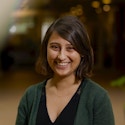
Ryoma Hattori, Ph.D.
Ryoma Hattori is an assistant project scientist at the University of California, San Diego. He received his B.S. from the University of Tokyo and A.M. and Ph.D. from Harvard University. He completed his doctoral thesis work in the laboratory of Takao K. Hensch, where he studied the developmental dynamics of multisensory interactions in the mouse visual cortex and related changes in mouse models of autism.

Leanna M. Hernandez, Ph.D.
Leanna Hernandez is a postdoctoral fellow at the University of California, Los Angeles (UCLA). She earned her Ph.D. in neuroscience in the laboratory of Mirella Dapretto, where her dissertation work used magnetic resonance imaging to characterize the impact of genetic variability in the OXTR gene on neurobiological heterogeneity and sex-differences in autism spectrum disorder (ASD).
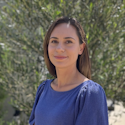
Katie Matho, Ph.D.
Katie Matho is a research investigator at Cold Spring Harbor Laboratory. She received her B.S. from Union College, and her M.S. and Ph.D., both in neuroscience, from Sorbonne Université in Paris, France. For her Ph.D. work with Jean Livet at Institut de la Vision in France, Matho mapped the microscale connectivity of auditory circuitry in the brainstem, in the emerging field of connectomics. She employed a multicolor “barcoding” strategy called “Brainbow,” whereby neurons express random combinations of fluorescent proteins, facilitating single-cell, large-volume image analysis. This technique enabled her to identify previously unknown instances of converging inputs within this circuit where 1:1 connectivity is thought to be the rule.
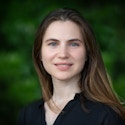
Martin Munz, Ph.D.
Martin Munz is a postdoctoral fellow in the lab of Botond Roska at the Institute of Molecular and Clinical Ophthalmology Basel. He is interested in understanding the role of activity during the inception of cortical circuits. Specifically, he developed imaging, molecular and electrophysiological techniques to allow the in vivo observation and manipulation of developing embryonic cortical circuits in mice. He plans to describe cell type-specific changes that occur in mice with autism-related mutations during embryonic development.

Michael Segel, Ph.D.
Michael Segel is a postdoctoral fellow at the Broad Institute of MIT and Harvard. He received his A.B. from Harvard College in human developmental and regenerative biology and his Ph.D. in clinical neuroscience from the University of Cambridge. For his doctoral thesis in the lab of Robin Franklin, he explored the molecular mechanisms underpinning the aging of glia in the central nervous syste

2021
Gabriella Boulting, Ph.D.
Gabriella Boulting earned a Ph.D. in biochemistry in the laboratory of Kevin Eggan in the Stem Cell and Regenerative Biology Department at Harvard University, where she focused on the application of human pluripotent stem cells (PSCs) to study neurogenerative disease. She developed methods to produce human spinal motor neurons in vitro, generated a vetted panel of human PSC lines for in vitro amyotrophic lateral sclerosis (ALS) disease modeling and uncovered disease phenotypes in motor neurons derived from induced PSCs from individuals with ALS.

Alexander Li Cohen, M.D., Ph.D.
Alexander Li Cohen is a physician-scientist and instructor in the Department of Neurology at Boston Children’s Hospital and Harvard Medical School. He received his B.A. in biology and biomedical physics from Washington University in St. Louis and his M.D. and Ph.D. degrees from Washington University School of Medicine in St. Louis. He then completed residency training in pediatrics and child neurology at Mayo Clinic in Rochester, Minnesota, and clinical and post-doctoral fellowships in pediatric behavioral neurology and translational research in neurodevelopmental disorders at Boston Children’s Hospital.

Eirene Markenscoff-Papadimitriou, Ph.D.
Eirene Markenscoff-Papadimitriou is a postdoctoral fellow at University of California, San Francisco (UCSF). She received her B.A. from Harvard College and her Ph.D. in Neuroscience at UCSF. For her doctoral thesis in the laboratory of Stavros Lomvardas, she explored the regulation of olfactory receptor genes and discovered a unique mode of gene regulation that involves inter-chromosomal interactions in the nucleus.
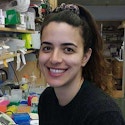
Marino Pagan, Ph.D.
Marino Pagan is a postdoctoral research associate at Princeton University. He received his B.S. in computer engineering and his M.S. in control engineering from Scuola Superiore Sant’Anna and University of Pisa in Italy. He completed his Ph.D. in neuroscience at University of Pennsylvania in the laboratory of Nicole Rust, where he studied the neural circuits of visual object search in macaque monkeys using electrophysiology and computational modeling.

Kartik Pattabiraman, M.D., Ph.D.
Kartik Pattabiraman is an Alfred J. Solnit Integrated Psychiatry Fellow at the Yale Child Study Center. He received his Sc.B. from Brown University and M.D. and Ph.D. from University of California, San Francisco. He completed his Ph.D. thesis work in the laboratory of John Rubenstein studying the gene regulatory networks involved in early cortical patterning.

Zhuzhu Zhang, Ph.D.
Zhuzhu Zhang is a postdoctoral research fellow at the Salk Institute for Biological Studies working with Joseph Ecker and Edward Callaway. She is broadly interested in understanding the epigenetic and transcriptional regulation in the mammalian brain at single-cell resolution, using both experimental and computational approaches. Specifically, Zhang studies the neuronal cell types and functions in the brain and investigates their molecular signatures in the context of neural pathways and circuits by developing and deploying novel single cell multi-omics approaches. She plans to further investigate cell type- and circuit-specific epigenetic regulations in normal postnatal brain development and in neurodevelopmental disorders and explore epigenetic mechanisms that underlie genotype-environment (GxE) interaction.

2020
Neir Eshel, M.D., Ph.D.
Neir Eshel is an instructor in the Department of Psychiatry and Behavioral Sciences at Stanford University. He received his A.B. from Princeton University, M.S. from University College London, and M.D./Ph.D. from Harvard University.

Ranmal Aloka Samarasinghe, M.D., Ph.D.
Ranmal Aloka Samarasinghe is a clinical instructor at the University of California, Los Angeles (UCLA). He received his M.D. and Ph.D. from the University of Pittsburgh in 2013. He performed his thesis research in the laboratory of Donald DeFranco, where he studied nongenomic actions of glucocorticoid hormones in neural progenitor cells.

Toni-Lee Sterley, Ph.D.
Toni-Lee Sterley is a postdoctoral associate at the University of Calgary. She completed her doctoral training in the laboratory of Vivienne Russell at the University of Cape Town. Her doctoral thesis used rodent models to investigate the influences of early life stress and genetic predispositions in the development of attention-deficit/hyperactivity disorder or depression, specifically looking at roles for glutamatergic and GABAergic transmission in observed behavioral phenotypes.

2019
Nicholas Frost, M.D., Ph.D.
Nicholas Frost is an adjunct clinical instructor at the University of California, San Francisco. He received his M.D. and Ph.D. at the University of Maryland School of Medicine. There, his thesis work in the laboratory of Thomas Blanpied focused on the regulation of actin polymerization within dendritic spines, utilizing super-resolution microscopy to track single molecules of polymerized actin moving within living neurons.

Ethan Greenblatt, Ph.D.
Ethan Greenblatt is an assistant professor at the University of British Columbia. He received his doctoral training in the laboratory of Ron Kopito at Stanford University, where he worked on cellular protein quality control mechanisms, showing a central role for membrane ‘pseudo’-proteases in the proteasomal degradation of misfolded secretory proteins.
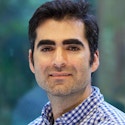
Fenna Krienen, Ph.D.
Fenna Krienen is a postdoctoral fellow at Harvard Medical School. She received her B.A. from the University California, Berkeley and completed her doctoral studies at Harvard University with Randy Buckner, where she used noninvasive neuroimaging to infer principles of corticocortical and corticocerebellar network architecture in the human brain.

J. Elliott Robinson, M.D., Ph.D.
J. Elliott Robinson is an assistant professor at Cincinnati Children's Hospital, University of Cincinnati School of Medicine. He completed his M.D. and Ph.D. in the Medical Scientist Training Program at the University of North Carolina (UNC) at Chapel Hill. His doctoral dissertation work, which was co-advised by C.J. Malanga (UNC) and Markus Heilig (National Institute on Alcohol Abuse and Alcoholism), investigated how the A118G mu opioid receptor gene polymorphism moderates dopaminergic and behavioral responses to alcohol and abused opioids.

Hume Stroud, Ph.D.
Hume Stroud is an assistant professor at the University of Texas Southwestern Medical Center. He received his doctoral training in the laboratory of Steve Jacobsen at the University of California, Los Angeles. His work focused on the regulation of DNA replication and transposon silencing in the model plant Arabidopsis thaliana. For his postdoctoral training, Stroud went on to join the laboratory of Michael Greenberg at Harvard Medical School, where he utilized genomic approaches to understand the regulation and function of DNA methylation in neurons in the developing brain.
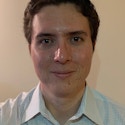
2018
Reza Kalhor, Ph.D.
Reza Kalhor is an assistant professor at Johns Hopkins University. His lab develops new tools using a variety of strategies, including molecular engineering, CRISPR-based manipulation and computational approaches. These tools are then applied to problems in mammalian development, neurobiology and synthetic biology.
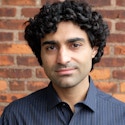
Xin Tang, Ph.D.
Xin Tang is an assistant professor at Harvard Medical School. He studies genetic and environmental factors regulating synaptic signal transmission, with a focus on KCC2 molecular pathways and the role of KCC2 dysregulation in autism spectrum disorder.
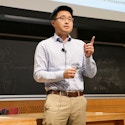
Donna Werling, Ph.D.
Donna Werling is an assistant professor at the University of Wisconsin–Madison. Her research is focused on understanding the key neurobiological mechanisms involved in the etiology of ASD and other neurodevelopmental disorders, including genetic and developmental processes, with a focus on the role of sex-differential biology in modulating risk.
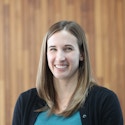
Peng Zhang, Ph.D.
Peng Zhang is interested in the role of extracellular matrix glycans in shaping synaptic properties and brain function. During his Ph.D., Zhang studied the role of O-mannosylated glycans on a-dystroglycan in regulating binding to laminin, and the assembly of the extracellular matrix, which is an underlying pathological mechanism in congenital muscular dystrophies. Subsequently, Zhang extended his interests in this area to the field of synaptic development in Ann Marie Craig’s laboratory. He discovered that neurexins (a class of synaptic adhesion molecules) are modified by a rare type of glycan called heparan sulfate, which is a constituent of the extracellular matrix.

2017
Ryan Doan, Ph.D.
Ryan Doan is an Instructor at Boston Children's Hospital. Doan’s research focuses on the important issue of understanding why many individuals with neurodevelopmental disorders lack a genetic diagnosis, both in clinical and research settings. The overall aim of his laboratory is to develop and implement a streamlined approach combining evolutionary and human genetics to discover novel noncoding mutations that can be targeted in a clinical diagnostic setting.

Michael Hart, Ph.D.
Michael Hart is a research associate at the University of Pennsylvania and a member of the Autism Spectrum Program of Excellence (ASPE). Hart’s research utilizes the nematode C. elegans to study and model disease genes and disease variants associated with autism spectrum disorder.

Rebecca Muhle, M.D., Ph.D.
Rebecca Muhle is an assistant professor at Columbia University. Muhle works with individuals with neurodevelopmental conditions such as autism spectrum disorder (ASD) and uses animal and cellular model systems to uncover the biological changes that occur when genes associated with ASD are disrupted.
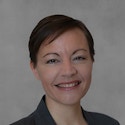
Gabriela Rosenblau, Ph.D.
Gabriela Rosenblau is an assistant professor of cognitive neuroscience in the psychology department at George Washington University. Her research combines computational models with functional neuroimaging to further our mechanistic understanding of typical and atypical human development and learning.
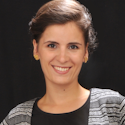
Stephanie Rudolph, Ph.D.
Stephanie Rudolph is an assistant professor at Albert Einstein College of Medicine. Rudolph uses a combination of genetic, viral, in vitro and in vivo techniques to assess neuromodulatory system interactions with, and effects on, cerebellar non-motor functions in mouse models of autism spectrum disorder.

Seth Shipman, Ph.D.
Seth Shipman is an assistant investigator at the Gladstone Institute and an assistant professor in bioengineering and therapeutic sciences at the University of California, San Francisco (UCSF). His lab engineers new functions into living cells to understand the fundamental biology of developing systems, particularly the brain.

Tingting Wang, Ph.D.
Tingting Wang is an assistant professor in the Department of Pharmacology & Physiology at Georgetown University. Her lab investigates the molecular mechanisms that underlie the homeostatic control of the nervous system and studies how impaired homeostatic plasticity may contribute to brain disorders, including autism.

2016
Sung Eun (Samuel) Kwon, Ph.D.
Sung Eun “Samuel” Kwon is an assistant professor in the Department of Molecular, Cellular and Developmental Biology at the University of Michigan, Ann Arbor. Kwon focuses on cellular, molecular and circuit mechanisms underlying sensory cortical plasticity in both health and conditions of neurocognitive disorders using in vivo imaging, electrophysiology, opto- and pharmaco-genetics, and behavior in the mammalian brain.

Michael Gandal, M.D., Ph.D.
Michael Gandal is an assistant professor at University of California, Los Angeles, and at the Semel Institute for Neuroscience and Human Behavior. His group uses systems-level genetic, genomic and transcriptomic approaches to understand the neurobiological mechanisms underlying autism, schizophrenia and related neurodevelopmental psychiatric disorders.

Yun Li, Ph.D.
Yun Li is an assistant professor at the University of Toronto and a scientist at the Hospital for Sick Children. Li’s laboratory utilizes a combination of pluripotent stem cell technology, genome editing and three-dimensional organoid culture systems to understand how the human brain forms, what makes it unique from that of other species and how disorders like autism impact human brain development and function.

Tomasz Nowakowski, Ph.D.
Tomasz Nowakowski is an assistant professor at the University of California, San Francisco. Nowakowski pioneered the use of single cell RNA sequencing to study the heterogeneity of cellular populations in the developing brain. His research focuses on understanding how the human genome reproducibly generates diverse neuronal populations and how genome abnormalities affecting these developmental processes cause developmental neuropsychiatric disorders like autism.

Rui Peixoto, Ph.D.
Rui Peixoto is an assistant professor at the University of Pittsburgh. His laboratory is focused on investigating the disruption of basal ganglia maturation by cortical hyperactivity in autism spectrum disorder.
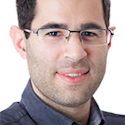
Aakanksha Singhvi, Ph.D.
Aakanksha Singhvi is an assistant member at the Fred Hutchinson Cancer Research Center. Singhvi’s laboratory focuses on understanding — at both a molecular and mechanistic level in C. elegans — how glia and neurons communicate with each other to regulate sensory perception, neuronal physiology, neural circuit activity, memory formation and animal behavior in both healthy and neurological disease states.

2015
Renata Batista-Brito, Ph.D.
Renata Batista-Brito is an assistant professor at Albert Einstein College of Medicine. Her lab combines cell-type specific manipulation of neuronal activity, in vivo electrophysiology, in vivo 2-photon imaging and behavioral analysis in order to understand how the postnatal developmental of inhibition shapes sensory representation in the mature brain and how this process is altered in neurodevelopmental disorders.

Graham Diering, Ph.D.
Graham Diering is an assistant professor at University of Carolina, Chapel Hill. He studies the molecular mechanisms of synaptic plasticity, with a particular interest in sleep. Using mouse models of human disease as well as primary cultured neurons, Diering applies his work to understanding and treating neurodevelopmental disorders, including autism and intellectual disability. He broadly studies biochemistry, pharmacology, animal behavior and genetics.

Sung Han, Ph.D.
Sung Han is an assistant professor at the Salk Institute for Biological Studies. His lab is interested in dissecting neural circuits that transmit aversive sensory signals to the brain.

Keren Haroush, Ph.D.
Keren Haroush is an assistant professor at Stanford University. Her laboratory studies the mechanisms by which highly complex behaviors are mediated at the neuronal level, mainly focusing on the example of dynamic social interactions and the neural circuits that drive them.
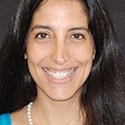
Holly Stessman, Ph.D.
Holly Stessman is an assistant professor at Creighton University, where she leads a research group identifying and functionally characterizing genetic variation that contributes to ASD disease biology.

Jason Yi, Ph.D.
Jason Yi is an assistant professor in the Department of Neuroscience at Washington University School of Medicine in St. Louis. His laboratory is broadly interested in the molecular pathways that shape nervous system development and function, with the ultimate goal of understanding how dysfunction in these pathways contributes to disease.

